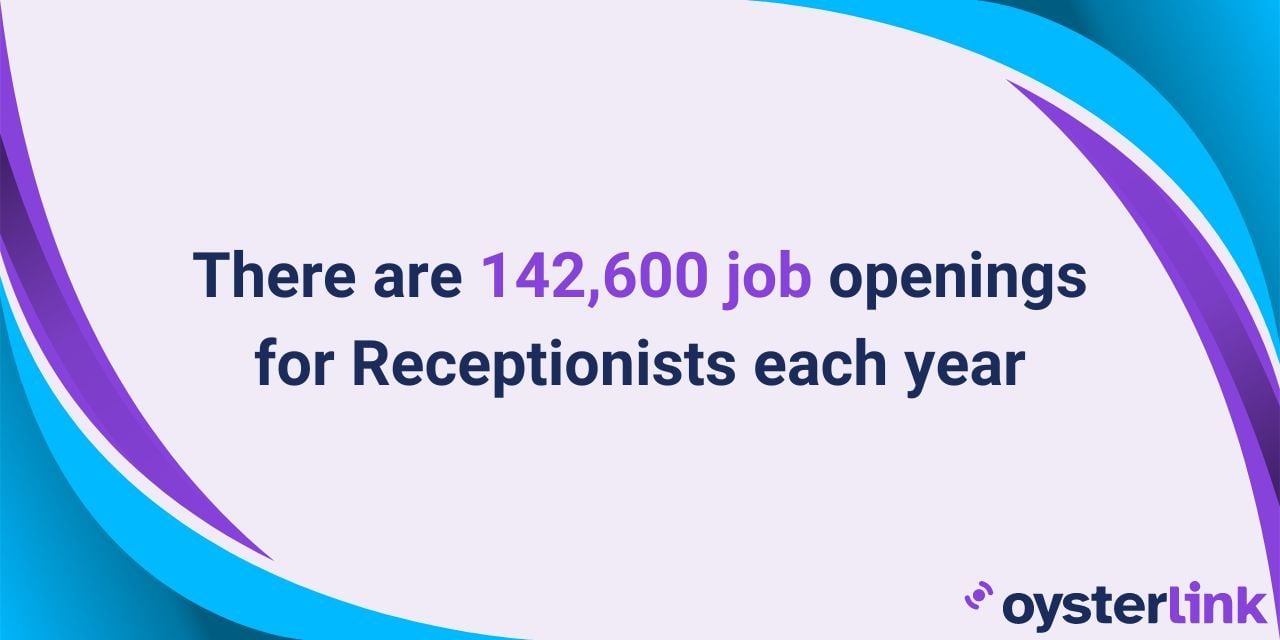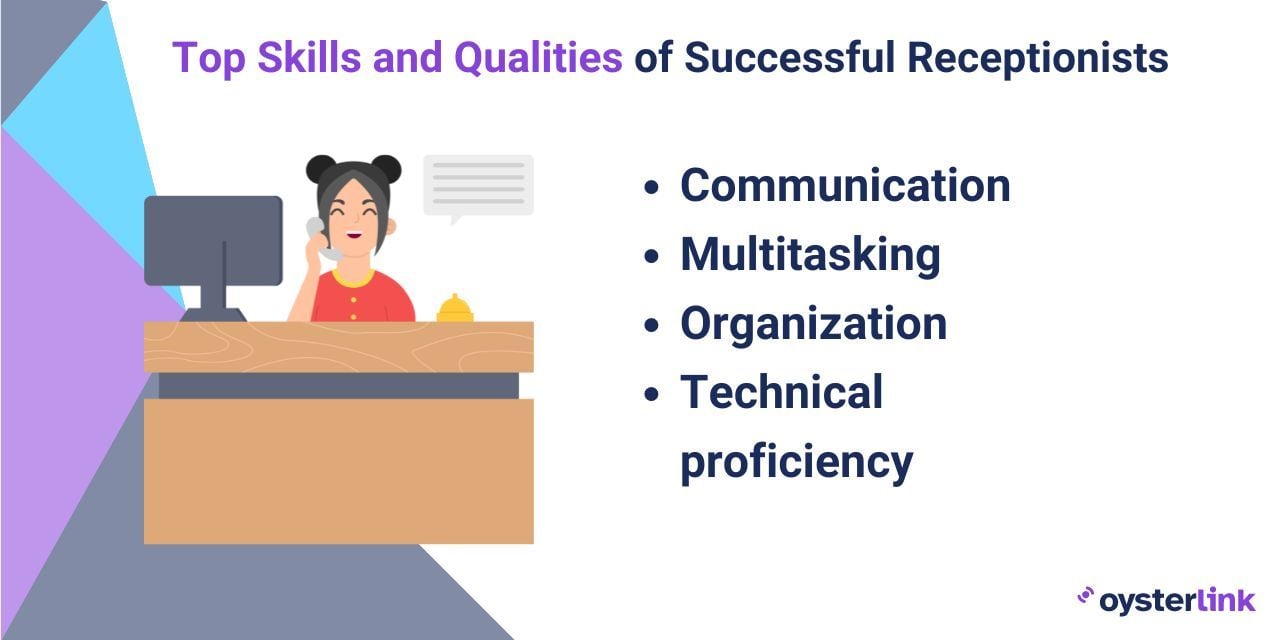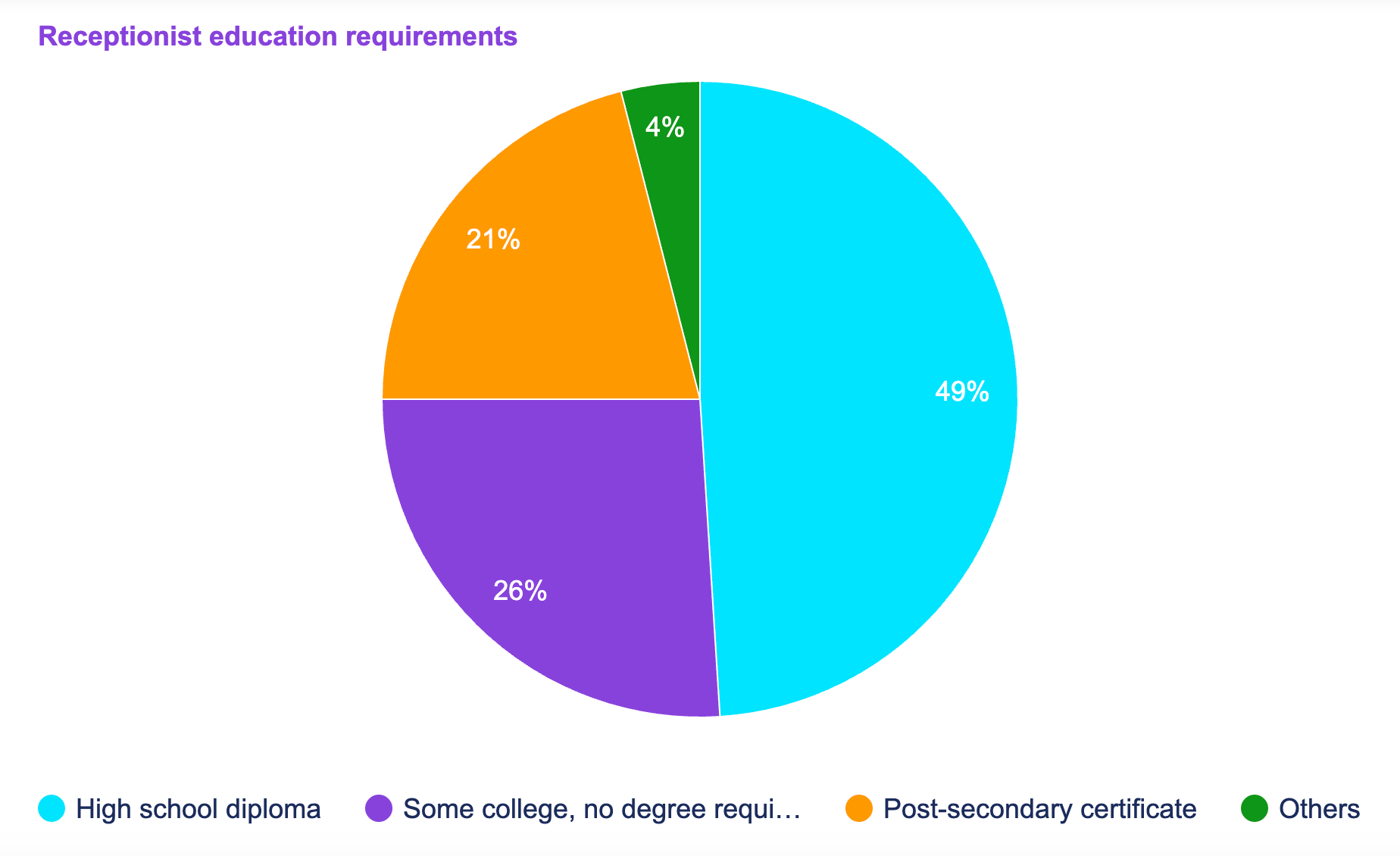Guide to a Receptionist Career
Receptionists work in almost all industries, according to the Bureau of Labor Statistics (BLS). In the United States, there are currently 1,003,820 individuals who work as Receptionists.
While the BLS states that there will be little change in the number of Receptionists in the next 10 years, there are still 142,600 openings for Receptionists each year.

With so many open positions, it is essential that you prepare for your interview and get informed about the position.
That is why we created this guide: to help you learn about a Receptionist’s duties, education requirements and more.
What Is a Receptionist?
A Receptionist is an individual who performs tasks such as answering phones, greeting visitors and providing general information about the company where they work.
They typically act as a first point of contact with a customer or a client.
While there are some duties that all Receptionists perform, their specific tasks will vary based on the employer.
For example, a Receptionist working in a hotel setting will have different task than a Receptionist working in a legal office.
What Does a Receptionist Do?
Receptionists are employed across all industries in the United States.
As such, their specific tasks might vary from industry to industry.
However, according to BLS, some of the universal Receptionist responsibilities include:
- Answering the phone and addressing inquiries
- Taking messages and forwarding calls
- Greeting and welcoming customers, potential clients and visitors
- Addressing visitors’ concerns and directing them to their desired destinations
- Make appointments and schedules
- Manage information and documents, be it paper or digital
- Process payments and other administrative tasks
Top Skills and Qualities of Successful Receptionists
The success of a Receptionist will usually depend on their skills, experience and how well they can manage the variety of tasks in the Receptionist role.

Some of the top skills that will help individuals thrive as a Receptionist include:
- Communication: Receptionists interact with visitors and clients, making communication one of their key skills. This allows them to address any inquires or concerns a potential customer might have.
- Multitasking: Receptionists must perform multiple tasks, often simultaneously. This makes multitasking an essential Receptionist skill to ensure the smooth operations of the organization where they work.
- Organization: Receptionists need to have excellent organizational skills to keep track of various administrative tasks. This includes setting up appointments and tracking schedule to ensure efficiency in the workplace.
- Technical proficiency: Receptionists often use various software to complete their duties. Technical proficiency is essential for successfully navigating all the digital responsibilities, from managing effective communications to completing administrative tasks.
How To Become a Receptionist
A Receptionist is an entry-level position, which means that individuals can usually become one with no prior experience.
Still, employers typically require Receptionists to possess a high school diploma or equivalent with a combination of various skills necessary for this role.
Education and Training for Receptionists
Receptionist is often an entry-level position, so there are typically no additional requirements in terms of education and training.
In fact, research from O*NET shows that almost 50% of Receptionists only need a high school diploma or equivalent.

However, applicants who are willing to go the extra mile and acquire additional certifications or training will have a competitive advantage over those without additional training.
Some of the common certifications for Receptionists include:
- Certified Administrative Professional (CAP): A prestigious certification by the International Association of Administrative Professionals (IAAP) that demonstrates superior administrative skills
- Certified Front Desk Representative (CFDR) certification: Offered by the American Hotel and Lodging Educational Institute (AHLEI); demonstrates the skills of Receptionists and front desk professionals in the hospitality industry
- The Microsoft Office Specialist (MOS): A certification that proves the individual’s excellence in Office applications and utilizing those in an office setting
Receptionist Salary and Earning Potential
An average Receptionist salary is $36,590 a year or $17.59 per hour.
While some Receptionists can earn as much as $22.77 per hour, others with less experience and skills for the role can earn as little as $12.95 per hour.
For a complete breakdown of Receptionist salaries in the U.S., visit our Receptionist salary page.
Receptionist Career Progression
Given the wide range of industries that employ Receptionists, there are several ways in which they can develop their careers.
Receptionists working in hotels or resorts (often referred to as Front Desk Agents or Front Desk Staff) can develop leadership and organizational skills to further their career. With additional training and certification, they can advance to roles such as Hotel Operations Manager or Hotel Manager.
In an office setting, acquiring additional skills can lead to the Receptionists becoming Office Managers. This role entails wider responsibilities such as making travel arrangements for business trips, restocking office supplies or industry-specific administrative tasks.
Meanwhile, Receptionists working in a legal, healthcare or other specialized setting can further develop skills to become specialized professionals in a particular area. Healthcare Receptionists, for example, can progress into a Medical Office Manager role.
Receptionist Work Environment
A Receptionist’s work environment might differ based on the industry in which they are employed.
In 2022, there were close to 1.1 million Receptionists, with the healthcare industry being the most prominent employer at 45%.
See the largest employers of Receptionists per industry below:
Receptionists often work in areas that are visible and accessible to the public, usually acting as the first point of contact between a business and its potential customers.
The areas where they work typically include the front desk, lobby, waiting rooms or similar areas depending on the industry and business.
Some of the main duties and responsibilities of a Receptionist include: answering calls, managing appointments and schedules and handling incoming and outgoing mail.
Given the dynamic nature of a Receptionist’s role and the necessity to effectively manage multiple tasks at once, this role can sometimes be stressful and overwhelming.
However, gaining experience, developing organization and time-management skills and building strong communication abilities can help Receptionists navigate the demands of the role more effectively, minimizing stress and ensuring smooth operations within the organization.
Pros and Cons of Being a Receptionist
Below are some of the main pros and cons of working as a Receptionist:
Pros:
- Varied tasks: The varying tasks in this role means that Receptionists can often expect engaging workdays with an opportunity to develop additional skills daily.
- Entry-level positions: Receptionist jobs often require little to no experience, making it a perfect starting point for many individuals who are looking to start their careers.
- Growth opportunities: Receptionists often develop various skills that can be useful in other roles. By obtaining additional certifications and skills, Receptionists can climb up the ladder and become Office Managers, Customer Service Specialists or a Hotel Manager.
Cons:
- It can be demanding: Receptions often have multiple tasks simultaneously. Without prior experience, some Receptionists might find the varied workload difficult to manage.
- Repetitive tasks: Some aspects of the Receptionist role, such as answering phones and performing routine administrative tasks, can be repetitive. This can lead to monotonous workdays, especially if there is no room for growth in the role.
- Potential difficult situations: Receptionists must deal with clients and visitors, potentially encountering difficult or upset individuals. Dealing with such situations can be tiring and demanding.